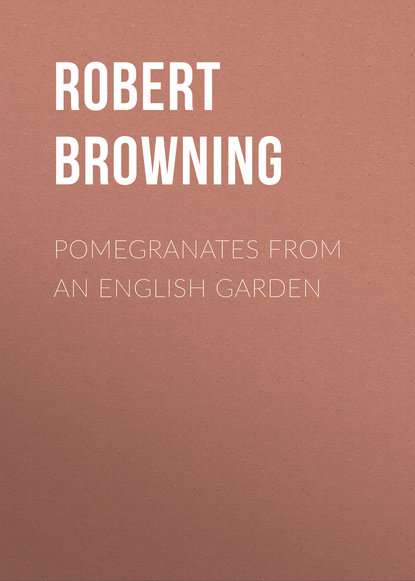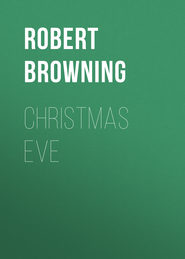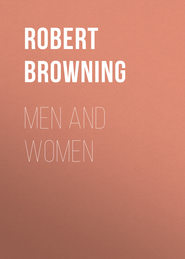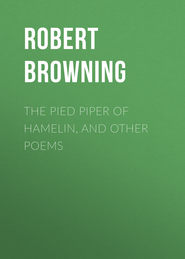По всем вопросам обращайтесь на: info@litportal.ru
(©) 2003-2024.
✖
Pomegranates from an English Garden
Настройки чтения
Размер шрифта
Высота строк
Поля
“Face, my hands fashioned, see it in myself!
“Thou hast no power nor may’st conceive of mine:
“But love I gave thee, with myself to love,
“And thou must love me who have died for thee!”
The madman saith He said so: it is strange.
This most interesting and beautiful poem will afford a good illustration of one of the cases of difficulty referred to in the Introduction. The reader is placed in the position of one who has just found this Arabian epistle, and must decipher and interpret it without any extraneous aid.
First comes, according to Eastern custom, the name (line 1), then the address (7), with the greeting (15), and mention of articles sent with the letter – all in true Eastern style – with such adjuncts as give a general idea of the school of physiology and medicine to which the writer belongs.
The twenty-first letter had ended at Jericho, and here, accordingly, the twenty-second begins. The date appears as we read on, marked by the expedition of Vespasian and his son Titus against Jerusalem. When Bethany is mentioned, our interest is awakened, and we wonder what is coming; but to the writer Bethany has no such associations, as is indicated by the light and jocular way in which he marks its distance from Jerusalem, and carelessly proceeds to record the observations it is his main business to make wherever he goes.
Further on, however, we discover that there is something of importance weighing on his mind, which makes him hesitate and debate as to the trustworthiness of the messenger he intends to employ; while, at the same time, he is evidently ashamed to tell his master what is troubling him. This accounts for his abruptly ending his letter (determining, for the moment, to say nothing about it); then, unable to refrain, beginning again, yet still trying to conceal the depth of his feeling, and to apologize for what appears in spite of himself.
A long account of the case follows. By this time the reader has begun to have a pretty good idea who “the man” is that “had something in the look of him,” and knows that it is a veritable case of one raised from the dead. But Karshish cannot, of course, except under strong compulsion, be expected to take this view; and, accordingly, he begins by looking at it in a strictly professional light – “’Tis but a case of mania,” &c. He naturally supposes that his master will set it down as an ordinary instance of hallucination: “Such cases are diurnal, thou wilt cry.” Then he mentions points which strike him as altogether peculiar, certain features of the “after life” which are quite inconsistent with the idea of mania. Instead of being the worse for his mania, this man is immeasurably the better. Could Karshish and his master but penetrate the secret, what physicians they would be! The scene when Lazarus is brought in by the Elders of his tribe – who regard him as a madman, because he is living a life so far above anything they can understand – is inimitable.
In the illustration of the beggar suddenly become rich, Karshish lets out at last that he suspects there must be some truth in the man’s story. His patient, he observes, now measures things with no earthly measure, seeing often the small in the great and the great in the small; looking at everything “with larger, other eyes than ours”; accepting with perfect equanimity the very greatest sorrow, yet filled with alarm at the least gesture or look which gives token of sin, because to him it was like trifling with a match over a mine of Greek fire!
In the next illustration, of the thread of life across an orb of glory, the writer seems to get still fuller insight into the reality of the case – the little thread being, of course, the poor life in Bethany, and the vast orb of glory, the great eternity of God, in which Lazarus was consciously living. And here, again, we have the same lesson as in “The Boy and the Angel.” Though conscious of the glory of the great orb, Lazarus does not despise the little duties belonging to the thread of his earthly life. He sedulously follows his trade whereby he earns his daily bread; indeed, the special characteristic of the man is “prone submission to the Heavenly will.” Mark the profound suggestiveness of the lines —
“He even seeketh not to please God more
(Which meaneth, otherwise) than as God please.”
He is so calm as to be provoking. At his inquisitor’s burst of indignation, he shows no sign of anger or impatience – “He merely looked with his large eyes on me.” And yet no apathy about him; a man full of loving interest in all things. (Compare Coleridge’s well-known lines: “He prayeth best who loveth best,” &c.)
The paragraph which follows introduces us to a region familiar and sacred to us, but foreign and inexplicable to our physician, who refers to it from his own point of view, stigmatizing the claim of “the Nazarene who wrought this cure” as not only false, but monstrous; and yet – and yet – and yet – he cannot get over it; it haunts him. But still he is ashamed to acknowledge it, and so turns abruptly from what he affects to call “trivial matters” to “things of price,” like “blue-flowering borage”!
Then he gives another elaborate apology, and tries to account for the hold the phenomenon has taken of him by a reference to his state of body and surroundings when first he met this Lazarus; and, accordingly, professing to care little whether the letter reaches or not, again he closes.
Yet still he cannot rest. The great thought haunts him. “The very God! think, Abib.” Then follows that consummate passage with which this magnificent poem closes.
After this “Epistle” should by all means be read “A Death in the Desert,” too long and too difficult to be inserted here. The surprise awaiting the reader of the parchment “supposed of Pamphylax the Antiochene” will add to the interest of a poem so full of beauty and power.
CHRISTMAS-EVE & EASTER-DAY
CHRISTMAS-EVE
Between Christmas-Eve and Easter-Morn lies the earth history of the Incarnate Son of God. Into the shadows of our world He came; and, after a brief night amid its darkness, rose again into the light of heaven. These titles then may well include the whole substance of Christianity. Christmas suggests the thought of heaven come down to earth; Easter, of earth raised up to heaven. “Christmas-Eve” leads naturally to the contemplation of the Christian Faith; “Easter-Day,” to the contemplation of the Christian Life.
Each poem turns on an impressive natural phenomenon which suggests the blending of heaven and earth – the one, of the night, a lunar rainbow; the other, of the dawn, the aurora borealis.
The speaker (who is the same throughout the former poem) begins his Christmas-Eve experiences with the flock assembling in “Zion Chapel,” a congregation of rude, unlettered people, worshipping with heart and soul indeed, but with little mind and less taste. It is not from choice that he is there. It is a stormy night of wind and rain, from which he has taken shelter in the “lath and plaster entry” of the little meeting house.
I
* * * * *
Five minutes full, I waited first!
In the doorway, to escape the rain
That drove in gusts down the common’s centre,
At the edge of which the chapel stands,
Before I plucked up heart to enter.
Heaven knows how many sorts of hands
Reached past me, groping for the latch
Of the inner door that hung on catch
More obstinate the more they fumbled,
Till, giving way at last with a scold
Of the crazy hinge, in squeezed or tumbled
One sheep more to the rest in fold,
And left me irresolute, standing sentry
In the sheepfold’s lath-and-plaster entry,
Four feet long by two feet wide,
Partitioned off from the vast inside —
I blocked up half of it at least.
No remedy; the rain kept driving.
They eyed me much as some wild beast,
That congregation, still arriving,
Some of them by the main road, white
A long way past me into the night,
Skirting the common, then diverging;
Not a few suddenly emerging
From the common’s self through the paling-gaps,
– They house in the gravel-pits perhaps,
Where the road stops short with its safeguard border
Of lamps, as tired of such disorder; —
But the most turned in yet more abruptly
From a certain squalid knot of alleys,
Where the town’s bad blood once slept corruptly,
Which now the little chapel rallies
And leads into day again, – its priestliness
Lending itself to hide their beastliness
So cleverly (thanks in part to the mason),
And putting so cheery a whitewashed face on
Those neophytes too much in lack of it,
That, where you cross the common as I did,
And meet the party thus presided,
“Mount Zion” with Love-lane at the back of it,
They front you as little disconcerted
As, bound for the hills, her fate averted,
And her wicked people made to mind him,
Lot might have marched with Gomorrah behind him.
In the same light and humorous, half irreverent style, he proceeds to a somewhat detailed description of the people and their uncouth worship – not altogether a caricature, but evidently wanting in that sympathy with the good at the heart of it, the thought of which was afterwards so strongly borne in upon his soul. So, he “very soon had enough of it,” and gladly “flung out of the little chapel” “into the fresh night air again.”
IV
There was a lull in the rain, a lull
In the wind too; the moon was risen,
And would have shone out pure and full,
But for the ramparted cloud-prison,
“Thou hast no power nor may’st conceive of mine:
“But love I gave thee, with myself to love,
“And thou must love me who have died for thee!”
The madman saith He said so: it is strange.
This most interesting and beautiful poem will afford a good illustration of one of the cases of difficulty referred to in the Introduction. The reader is placed in the position of one who has just found this Arabian epistle, and must decipher and interpret it without any extraneous aid.
First comes, according to Eastern custom, the name (line 1), then the address (7), with the greeting (15), and mention of articles sent with the letter – all in true Eastern style – with such adjuncts as give a general idea of the school of physiology and medicine to which the writer belongs.
The twenty-first letter had ended at Jericho, and here, accordingly, the twenty-second begins. The date appears as we read on, marked by the expedition of Vespasian and his son Titus against Jerusalem. When Bethany is mentioned, our interest is awakened, and we wonder what is coming; but to the writer Bethany has no such associations, as is indicated by the light and jocular way in which he marks its distance from Jerusalem, and carelessly proceeds to record the observations it is his main business to make wherever he goes.
Further on, however, we discover that there is something of importance weighing on his mind, which makes him hesitate and debate as to the trustworthiness of the messenger he intends to employ; while, at the same time, he is evidently ashamed to tell his master what is troubling him. This accounts for his abruptly ending his letter (determining, for the moment, to say nothing about it); then, unable to refrain, beginning again, yet still trying to conceal the depth of his feeling, and to apologize for what appears in spite of himself.
A long account of the case follows. By this time the reader has begun to have a pretty good idea who “the man” is that “had something in the look of him,” and knows that it is a veritable case of one raised from the dead. But Karshish cannot, of course, except under strong compulsion, be expected to take this view; and, accordingly, he begins by looking at it in a strictly professional light – “’Tis but a case of mania,” &c. He naturally supposes that his master will set it down as an ordinary instance of hallucination: “Such cases are diurnal, thou wilt cry.” Then he mentions points which strike him as altogether peculiar, certain features of the “after life” which are quite inconsistent with the idea of mania. Instead of being the worse for his mania, this man is immeasurably the better. Could Karshish and his master but penetrate the secret, what physicians they would be! The scene when Lazarus is brought in by the Elders of his tribe – who regard him as a madman, because he is living a life so far above anything they can understand – is inimitable.
In the illustration of the beggar suddenly become rich, Karshish lets out at last that he suspects there must be some truth in the man’s story. His patient, he observes, now measures things with no earthly measure, seeing often the small in the great and the great in the small; looking at everything “with larger, other eyes than ours”; accepting with perfect equanimity the very greatest sorrow, yet filled with alarm at the least gesture or look which gives token of sin, because to him it was like trifling with a match over a mine of Greek fire!
In the next illustration, of the thread of life across an orb of glory, the writer seems to get still fuller insight into the reality of the case – the little thread being, of course, the poor life in Bethany, and the vast orb of glory, the great eternity of God, in which Lazarus was consciously living. And here, again, we have the same lesson as in “The Boy and the Angel.” Though conscious of the glory of the great orb, Lazarus does not despise the little duties belonging to the thread of his earthly life. He sedulously follows his trade whereby he earns his daily bread; indeed, the special characteristic of the man is “prone submission to the Heavenly will.” Mark the profound suggestiveness of the lines —
“He even seeketh not to please God more
(Which meaneth, otherwise) than as God please.”
He is so calm as to be provoking. At his inquisitor’s burst of indignation, he shows no sign of anger or impatience – “He merely looked with his large eyes on me.” And yet no apathy about him; a man full of loving interest in all things. (Compare Coleridge’s well-known lines: “He prayeth best who loveth best,” &c.)
The paragraph which follows introduces us to a region familiar and sacred to us, but foreign and inexplicable to our physician, who refers to it from his own point of view, stigmatizing the claim of “the Nazarene who wrought this cure” as not only false, but monstrous; and yet – and yet – and yet – he cannot get over it; it haunts him. But still he is ashamed to acknowledge it, and so turns abruptly from what he affects to call “trivial matters” to “things of price,” like “blue-flowering borage”!
Then he gives another elaborate apology, and tries to account for the hold the phenomenon has taken of him by a reference to his state of body and surroundings when first he met this Lazarus; and, accordingly, professing to care little whether the letter reaches or not, again he closes.
Yet still he cannot rest. The great thought haunts him. “The very God! think, Abib.” Then follows that consummate passage with which this magnificent poem closes.
After this “Epistle” should by all means be read “A Death in the Desert,” too long and too difficult to be inserted here. The surprise awaiting the reader of the parchment “supposed of Pamphylax the Antiochene” will add to the interest of a poem so full of beauty and power.
CHRISTMAS-EVE & EASTER-DAY
CHRISTMAS-EVE
Between Christmas-Eve and Easter-Morn lies the earth history of the Incarnate Son of God. Into the shadows of our world He came; and, after a brief night amid its darkness, rose again into the light of heaven. These titles then may well include the whole substance of Christianity. Christmas suggests the thought of heaven come down to earth; Easter, of earth raised up to heaven. “Christmas-Eve” leads naturally to the contemplation of the Christian Faith; “Easter-Day,” to the contemplation of the Christian Life.
Each poem turns on an impressive natural phenomenon which suggests the blending of heaven and earth – the one, of the night, a lunar rainbow; the other, of the dawn, the aurora borealis.
The speaker (who is the same throughout the former poem) begins his Christmas-Eve experiences with the flock assembling in “Zion Chapel,” a congregation of rude, unlettered people, worshipping with heart and soul indeed, but with little mind and less taste. It is not from choice that he is there. It is a stormy night of wind and rain, from which he has taken shelter in the “lath and plaster entry” of the little meeting house.
I
* * * * *
Five minutes full, I waited first!
In the doorway, to escape the rain
That drove in gusts down the common’s centre,
At the edge of which the chapel stands,
Before I plucked up heart to enter.
Heaven knows how many sorts of hands
Reached past me, groping for the latch
Of the inner door that hung on catch
More obstinate the more they fumbled,
Till, giving way at last with a scold
Of the crazy hinge, in squeezed or tumbled
One sheep more to the rest in fold,
And left me irresolute, standing sentry
In the sheepfold’s lath-and-plaster entry,
Four feet long by two feet wide,
Partitioned off from the vast inside —
I blocked up half of it at least.
No remedy; the rain kept driving.
They eyed me much as some wild beast,
That congregation, still arriving,
Some of them by the main road, white
A long way past me into the night,
Skirting the common, then diverging;
Not a few suddenly emerging
From the common’s self through the paling-gaps,
– They house in the gravel-pits perhaps,
Where the road stops short with its safeguard border
Of lamps, as tired of such disorder; —
But the most turned in yet more abruptly
From a certain squalid knot of alleys,
Where the town’s bad blood once slept corruptly,
Which now the little chapel rallies
And leads into day again, – its priestliness
Lending itself to hide their beastliness
So cleverly (thanks in part to the mason),
And putting so cheery a whitewashed face on
Those neophytes too much in lack of it,
That, where you cross the common as I did,
And meet the party thus presided,
“Mount Zion” with Love-lane at the back of it,
They front you as little disconcerted
As, bound for the hills, her fate averted,
And her wicked people made to mind him,
Lot might have marched with Gomorrah behind him.
In the same light and humorous, half irreverent style, he proceeds to a somewhat detailed description of the people and their uncouth worship – not altogether a caricature, but evidently wanting in that sympathy with the good at the heart of it, the thought of which was afterwards so strongly borne in upon his soul. So, he “very soon had enough of it,” and gladly “flung out of the little chapel” “into the fresh night air again.”
IV
There was a lull in the rain, a lull
In the wind too; the moon was risen,
And would have shone out pure and full,
But for the ramparted cloud-prison,








